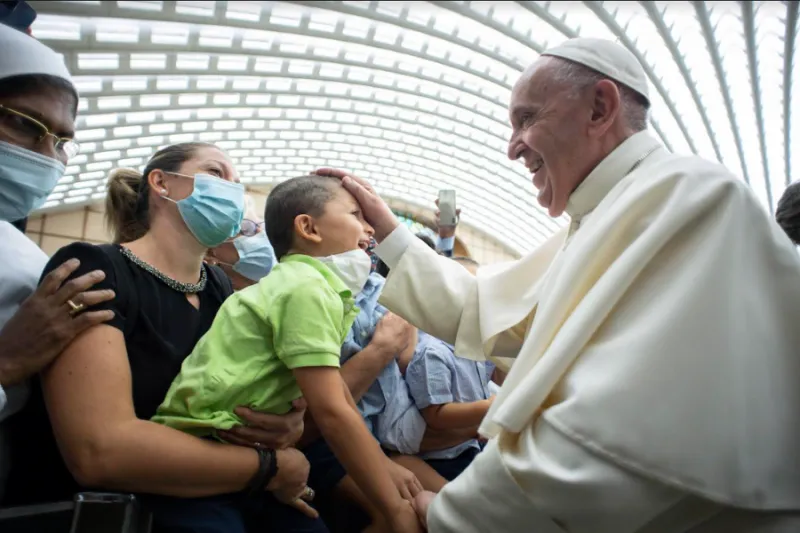
Vatican City, Sep 18, 2021 / 07:25 am (CNA).
Pope Francis said on Saturday that the two-year process leading to the 2023 synod on synodality is not about “gathering opinions,” but “listening to the Holy Spirit.”
Addressing Catholics from the Diocese of Rome on Sept. 18, the pope noted that preparations for the synod would take place in three phases between October 2021 and October 2023.
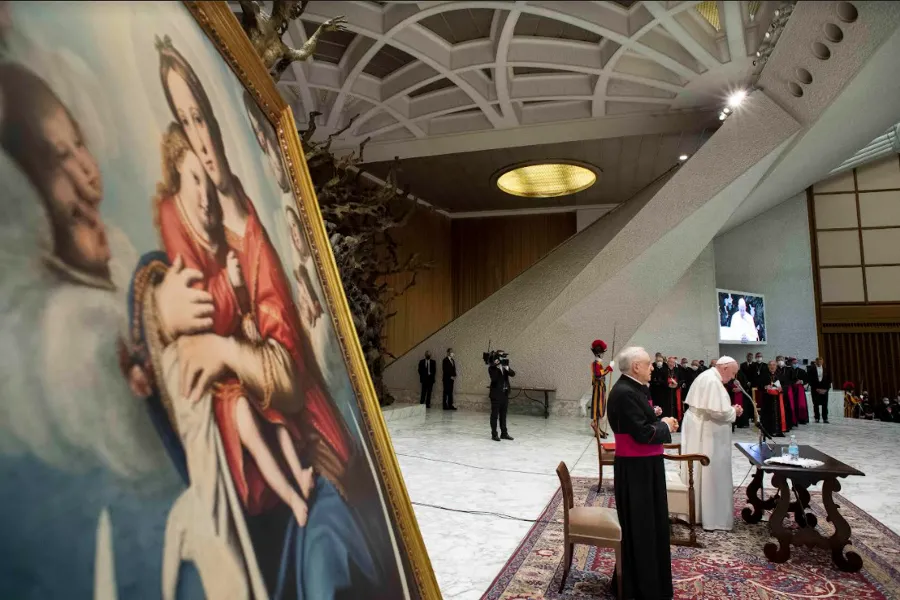
He said that the process sought to create “a dynamism of mutual listening” at all levels of the Church.
“This is not about gathering opinions, no. This is not an inquiry; but it is about listening to the Holy Spirit,” he said.
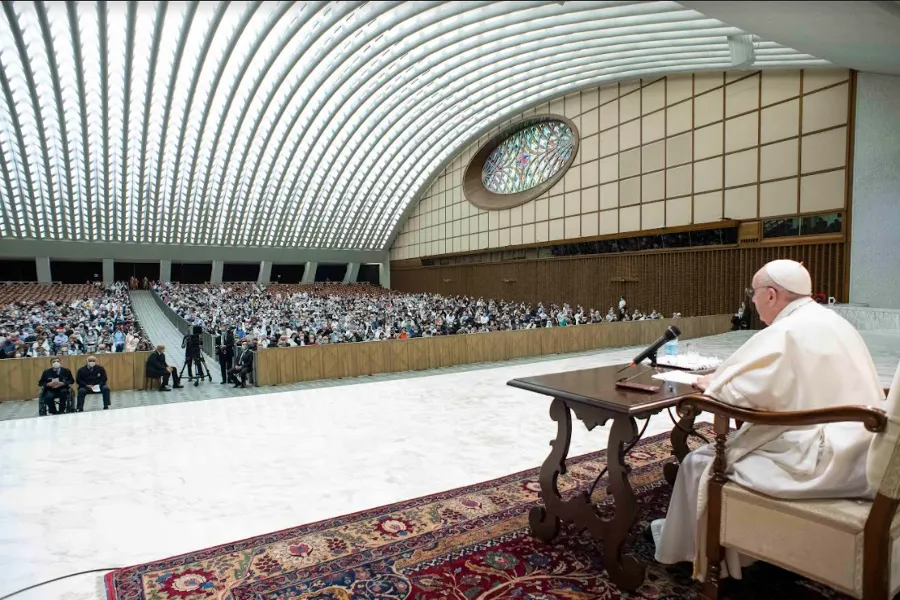
The Vatican announced in May that the synod on synodality would open with a diocesan phase lasting from October 2021 to April 2022.
A second, continental phase will take place from September 2022 to March 2023.
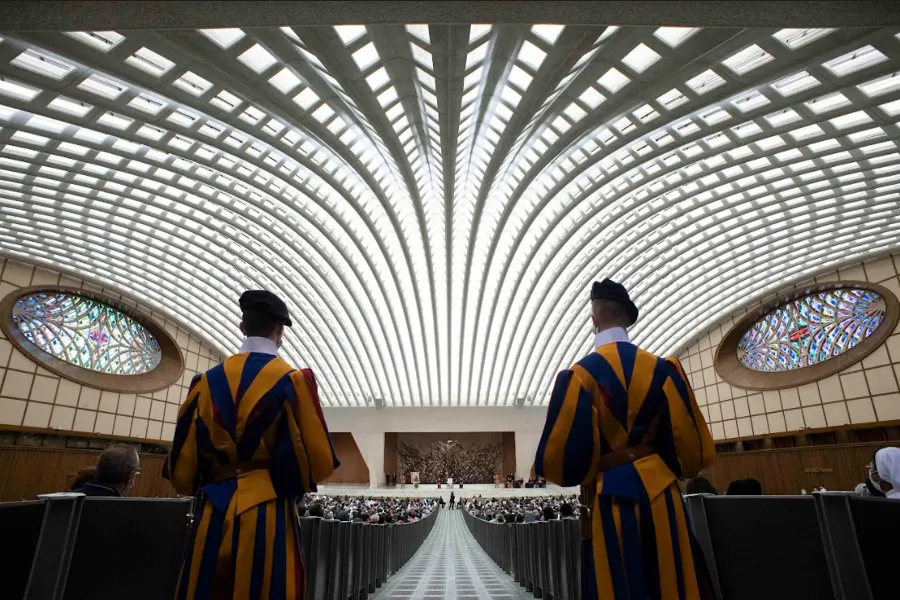
The third, universal phase will begin in October 2023 with the XVI Ordinary General Assembly of the Synod of Bishops, dedicated to the theme “For a Synodal Church: Communion, Participation, and Mission,” at the Vatican.
The 84-year-old pope read his live-streamed address seated in the Vatican’s Paul VI Hall, frequently adding off-the-cuff remarks.
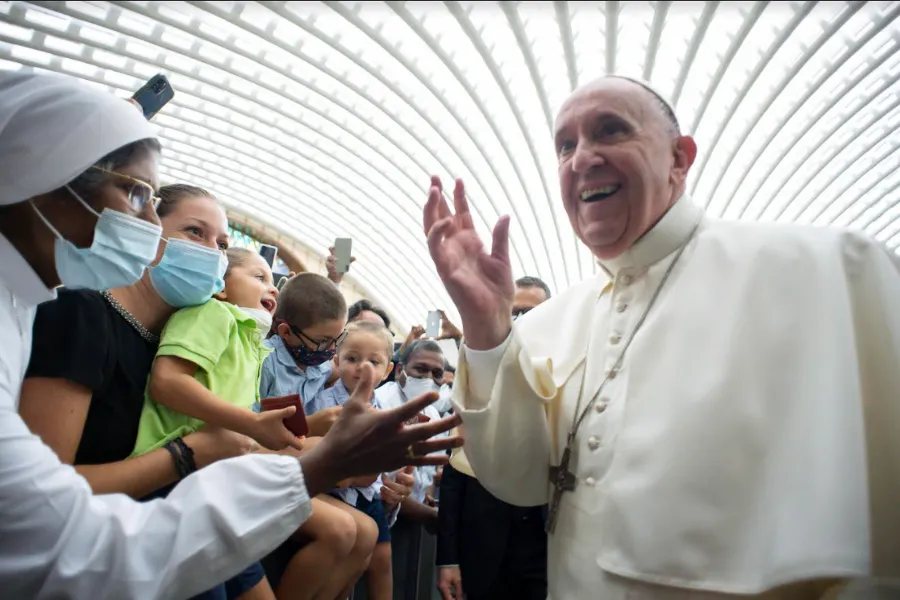
The speech was one of his most extensive reflections on the theme of “synodality,” a concept at the heart of his pontificate.
At one point, he apologized for the length of his speech, but said it was necessary as “the synod is a serious thing.” The audience responded with applause.
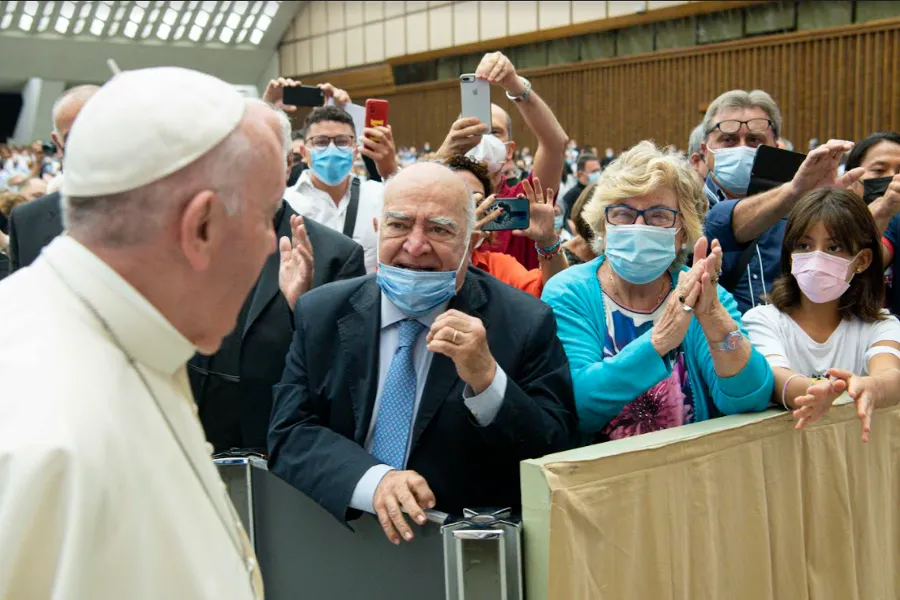
The pope outlined his vision and hopes for the synod, which some Vatican commentators have described as the most significant Catholic event since the Second Vatican Council in 1962-65.
He said that, as Bishop of Rome, he considered it vital that the Diocese of Rome committed itself “with conviction” to the synodal process.
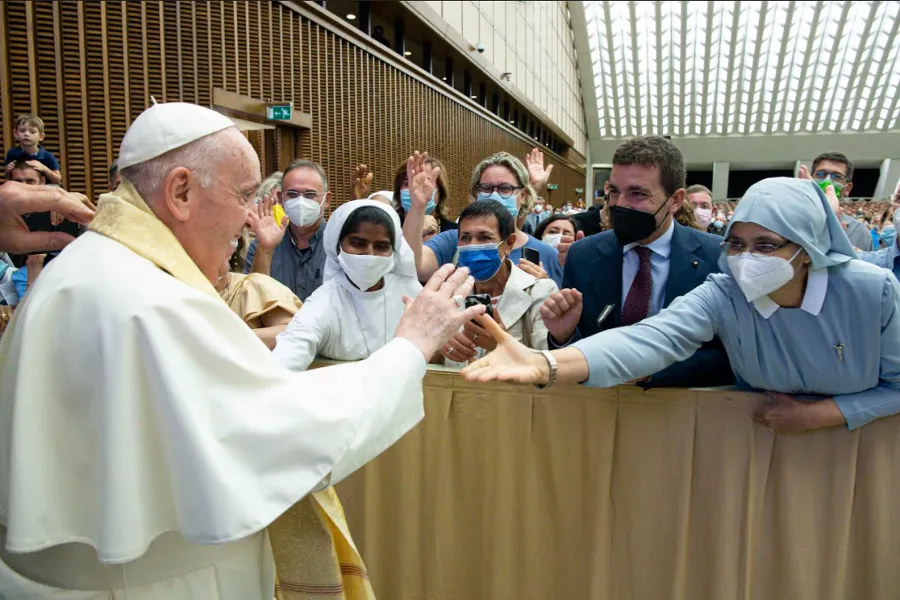
Smiling, he said it would be an “embarrassment” if his own diocese did not embrace the initiative.
“The theme of synodality is not a chapter in a treatise on ecclesiology, much less a fad, a slogan, or a new term to use or instrumentalize in our meetings. No! Synodality expresses the nature of the Church, its form, its style, its mission,” he explained.
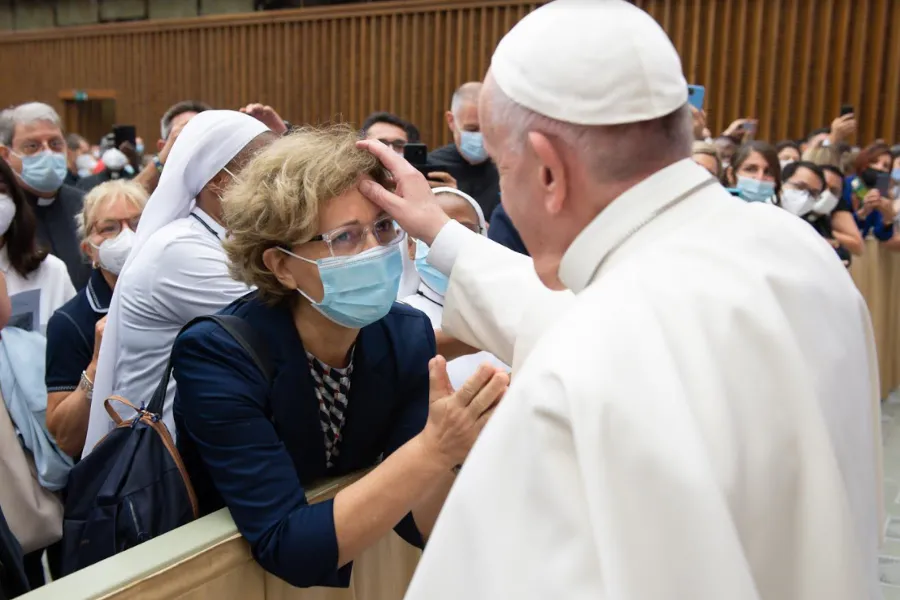
“And so we speak of a Synodal Church, avoiding, however, to consider that it is just one title among others, a way of thinking about it that foresees alternatives.”
The pope said that this wasn’t simply a “theological opinion” or merely a “personal thought,” but rather the blueprint for the Church contained in the Acts of the Apostles, which shows the early Christian community “walking together.”
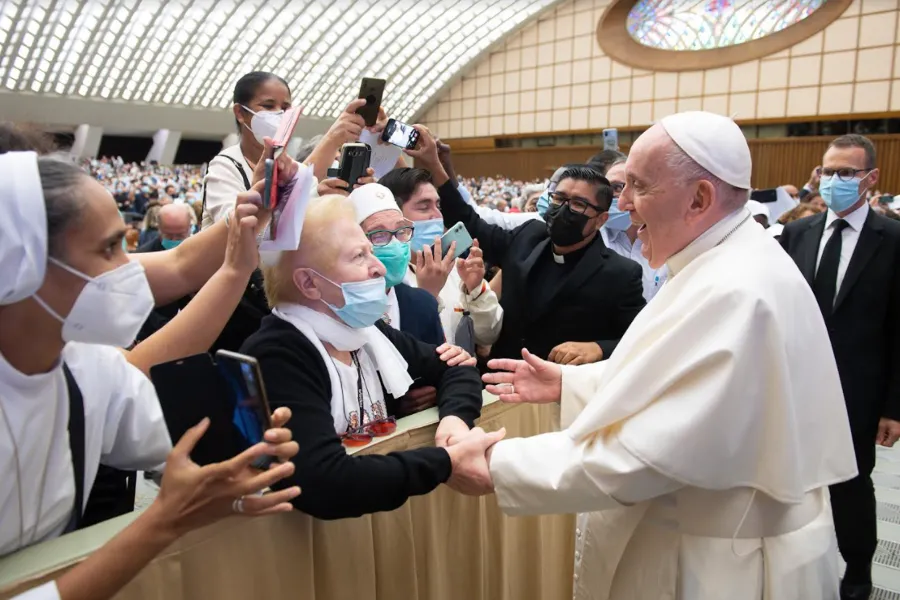
He reflected on episodes from the New Testament book, which showed how the first Christians resolved their seemingly irreconcilable differences by gathering together to make decisions.
He repeatedly emphasized the Holy Spirit’s leading role in decision-making.
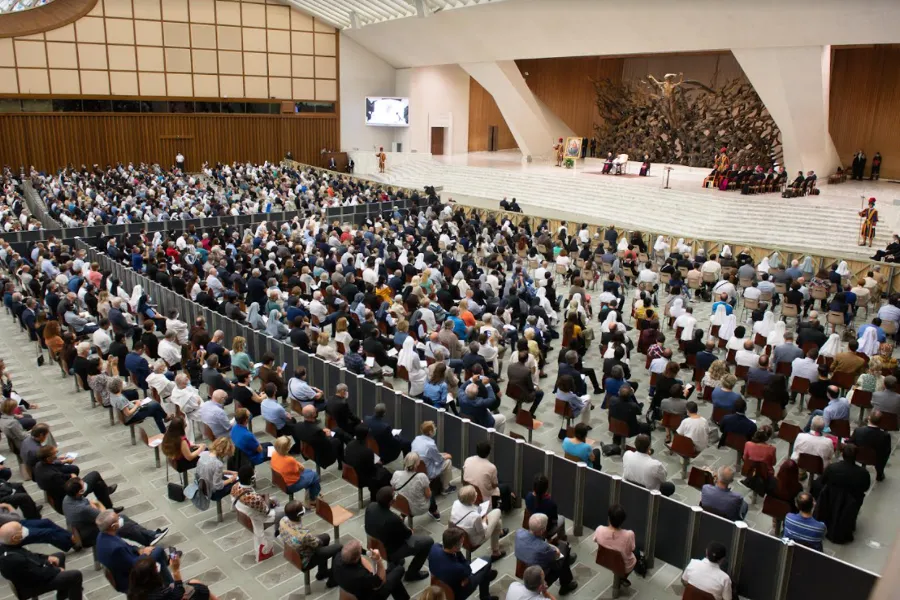
He said: “There will always be discussions, thank God, but solutions are to be sought by giving the word to God and his voices in our midst; by praying and opening our eyes to all that surrounds us; by practicing a life faithful to the Gospel; examining Revelation according to a pilgrim hermeneutic that knows how to preserve the path begun in the Acts of the Apostles.”
“And this is important: the way of understanding, of interpreting. A pilgrim hermeneutic, that is, one that is on the move. The journey that began after the Council? No. It began with the first Apostles and continues.”
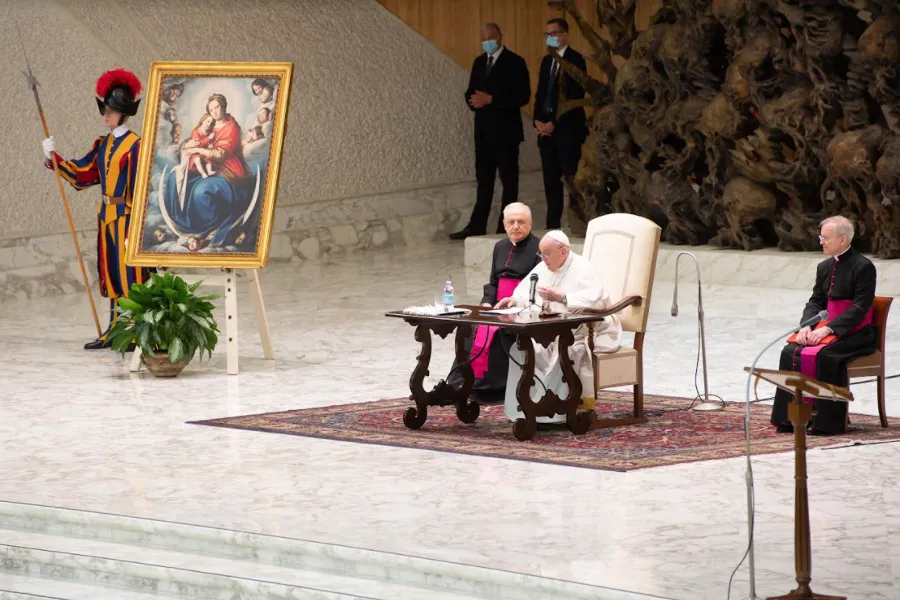
Describing how the faith is passed on from one generation to the next, the pope quoted the composer Gustav Mahler as saying that “tradition is not the worship of ashes but the preservation of fire.”
He said: “You see how our Tradition is a leavened dough, a reality in ferment where we can recognize growth, and in the dough, a communion that is implemented in movement: walking together realizes true communion.”

The pope stressed the importance of the diocesan phase of the synodal process. Earlier this month, the Vatican released a preparatory document and handbook to help dioceses worldwide to take part.
The pope said the initial phase was critical because it sought to involve “the totality of the baptized.”
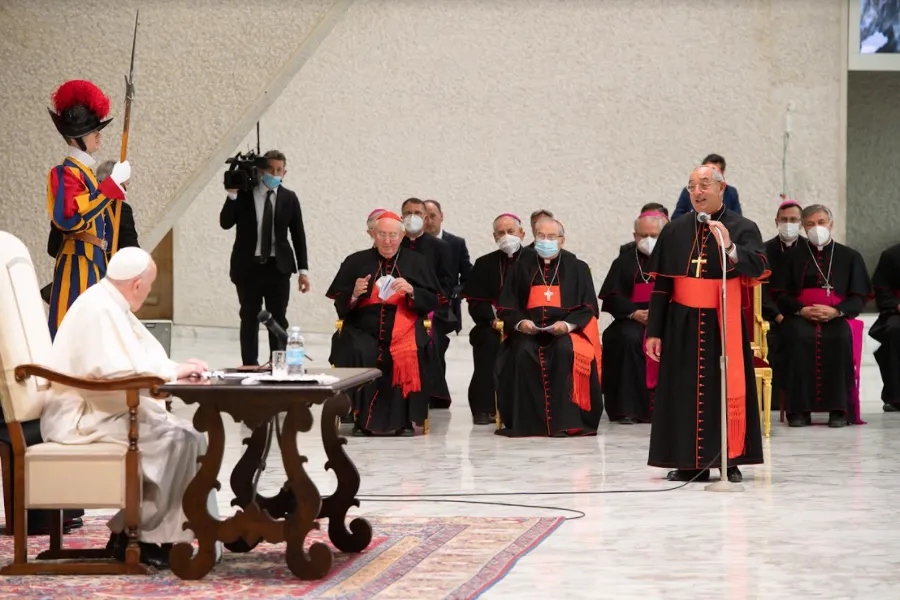
“There are many resistances to overcome the image of a Church rigidly distinguished between leaders and subordinates, between those who teach and those who must learn, forgetting that God likes to overturn positions,” he commented.
He continued: “The exercise of the sensus fidei [sense of the faith] cannot be reduced to the communication and comparison of opinions that we may have regarding this or that theme, that single aspect of doctrine, or that rule of discipline.”
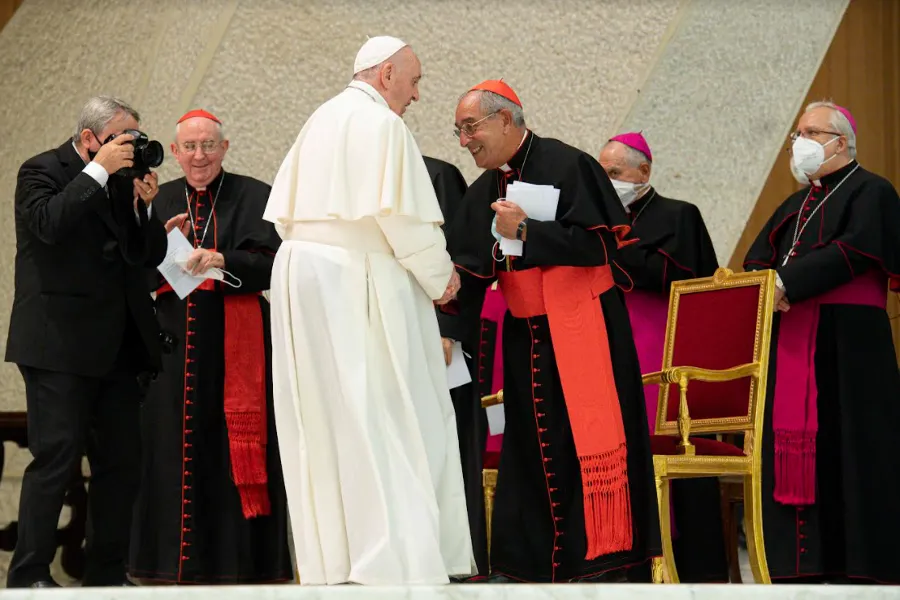
“No, those are instruments, they are verbalizations, they are dogmatic or disciplinary expressions. But the idea of distinguishing majorities and minorities must not prevail: a parliament does that.”
The pope then meditated on the meaning of the phrase “people of God,” a major theme of Vatican II’s Dogmatic Constitution on the Church, Lumen gentium.
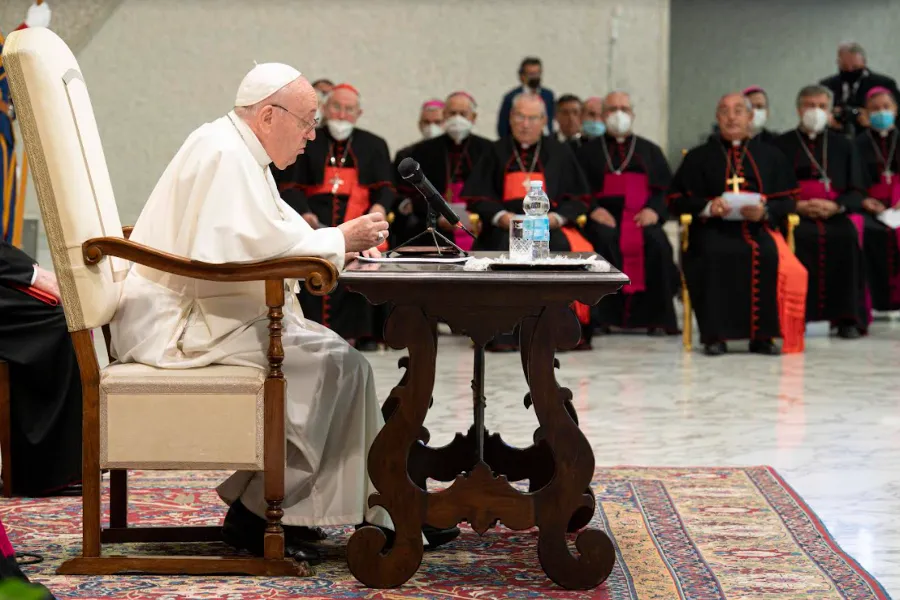
He said that belonging to the people of God was not a matter of “exclusivity” but of receiving a gift that comes with the responsibility to witness to God.
“Why do I tell you these things?” he asked. “Because in the synodal journey, listening must take into account the sensus fidei, but it must not overlook all those ‘presentiments’ embodied where we would not expect them.”
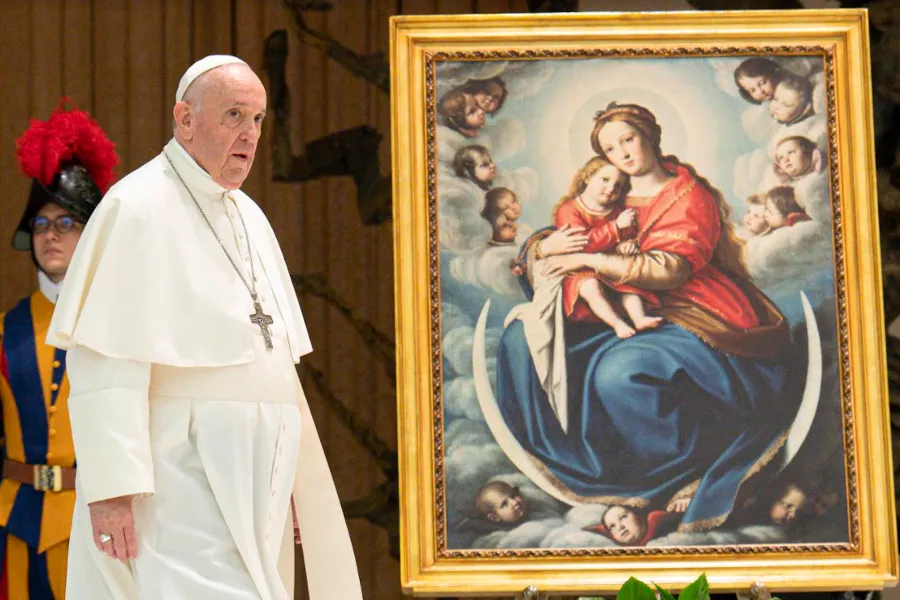
The Holy Spirit, he said, knows no boundaries and parishes should therefore be open to all and not limit themselves “to considering only those who attend or think like you.”
“Allow everyone to enter… Allow yourselves to go out to meet them and allow yourselves to be questioned, let their questions be your questions, allow yourselves to walk together: the Spirit will lead you, trust the Spirit. Do not be afraid to enter into dialogue and allow yourselves to be disrupted by the dialogue: it is the dialogue of salvation,” he said.
Concluding his address, Pope Francis urged members of Rome diocese to play an active role in the synod’s preparations.
“I have come here to encourage you to take this synodal process seriously and to tell you that the Holy Spirit needs you. And this is true: the Holy Spirit needs us. Listen to him by listening to each other. Don’t leave anyone out or behind,” he said.
“It will be good for the Diocese of Rome and for the whole Church, which is strengthened not just by reforming structures — that is the great deception! — by giving instructions, offering retreats and conferences, or through directives and programs — this is good, but as part of something else — but if it rediscovers that it is a people that wants to walk together, among ourselves and with humanity.”
He added: “But it is necessary to get out of the 3-4% that represents those closest to us, and go beyond that to listen to the others, who will sometimes insult you, they will chase you away, but it is necessary to hear what they think, without wanting to impose our things: let the Spirit speak to us.”
If you value the news and views Catholic World Report provides, please consider donating to support our efforts. Your contribution will help us continue to make CWR available to all readers worldwide for free, without a subscription. Thank you for your generosity!
Click here for more information on donating to CWR. Click here to sign up for our newsletter.





I like the quote from Mahler: Tradition is not the worship of ashes but the preservation of fire.
Mm.
P.S. Who is responsible for all these photos?
I find them distracting. One well-chosen photo would be preferable, IMO.
The photos in the CNA news piece are from CNA.
Any photo of the repulsively ugly architecture of that hall is distracting.
Yes to “mutual listening,” and with this listening certainly as partly our response to: “Go ye therefore, and teach [!] all nations, baptizing them in the name of the Father, and of the Son, and of the Holy Ghost” (Mt 28:19: this, “the image of a Church rigidly distinguished between leaders and subordinates, between those who teach and those who must learn”?)
And, apart from a discerning “listening,” the Synod on Synodality is not a fig leaf for graffiti theology already evident, for those who also “have eyes to see”—the German synodal way.
So, yes to “preservation of the fire,” but in a fallen world and with the poet T.S. Eliot, also this: “Between the idea, and the reality, Between the motion, and the act, Falls the Shadow…”
…the “ashes” of Germania seeking legs to go pandemic—-their cancel-culture of redefined sexual morality and of already blessing oxymoronic “gay marriages;” the proposal for time-share pastors to replace the permanence of sacramental ordination; the proposal for (invalid) female ordination; a mutant sensus fidei canceling the distinction between lay and ordained roles faithful to the apostolic succession (the Council: differing “in kind as well as degree”) with “binding” majoritarianism (all of which concerns the front office, but which festers undeterred).
So, as for listening to the Holy Spirit, yes absolutely, and it possibly goes without saying, but still this: “Beloved, do not believe every spirit, but test the spirits to see whether they are from God, for many false prophets have gone out into the world.”
Yes, it goes without saying that each of us listen to the Holy Spirit, petitions for which happens to exist in the traditional liturgies Francis despises. What we also pray for, in traditional litanies, is that blessed eternal truth be preserved by we lowly servants.
What are the odds that Francis, acolyte of the late we-must-be-with-the-times Cdl. Martini, our Francis, who has unambiguously stated that God can change His mind, who has never contrived to solicit any form of “listening,” farcical surveys notwithstanding, that does not conform to his preconceived notions of his new Catholicism with a predetermined “consensus” will make the slightest allowance for contemplating the intrinsic rot of the zeitgeist and that it is the Church’s continuing mission to stand opposed to it.
As described by Pope Francis the Synod on Synodality’s intent is openness to the Holy Spirit from whatever source, to whatever is said whether in agreement with our beliefs [how we think, namely in what we believe]. That the “Holy Spirit needs us” suggests we are in need of further revelation. As if the Holy Spirit has need for you or I to be prophetic. It’s theme as described by Pope Francis is unquestionably a search for truth. That may have validity if truth is in reference to new forms of evangelization. It cannot be in reference to new forms of doctrinal truth on faith and morals. As presented by His Holiness the impression is an open endedness regarding revealed truth. Compelling us to listen to opinion from whatever the source presuming opinions are the work of the Holy Spirit implies willingness to redefine what we believe. As the Holy Father would say, There is no other interpretation. Still we have the Letter to Hebrews presumably that we are not to seek further revelation. A search for truth on this universal scale puts into question whether there has indeed been a timeless revelation in Christ. And whether that revelation, integral to the definition of the universal [Catholic] Church, is constrained by a hermeneutic of continuity? Again, citing the Pontiff’s words, There can be no other interpretation.
Yes, Fr. Morello. Yes to ‘That the “Holy Spirit needs us” suggests we are in need of further revelation. As if the Holy Spirit has need for you or I to be prophetic.’
Further, I doubt that many ‘Catholics’ would recognize the gifts of the Holy Spirit if He delivered them on silver platters and attached a miracle attesting them as His gifts.
Meiron you may be aware of the influence of Jesuit Cardinal Martini years past on then Archbishop Bergoglio and the idea of synodality. “Our church is 200 years out of date. Our culture has aged, our churches are big and empty and the church bureaucracy rises up. The Church must admit its mistakes and begin a radical change, starting from the Pope and the bishops. The pedophilia scandals oblige us to take a journey of transformation” (Cardinal Mario Martini SJ NCReporter 2012). On face value Cardinal Mario Martini SJ’s comment couldn’t be more accurate. Except for his prescription for radical change. Among the more liberal cardinals appointed archbishop Milan 1980 cardinal 1983 by Pope John Paul II, Martini’s positions back then are Pope Francis’ now. Martini was mentor to the then Buenos Aires Archbishop. With the words of Martini, journey of transformation, used in warm memoriam Francis has launched the listing Brig of Peter unto unknown waters. A highly decorated member [awards from the Russian Academy of Sciences, Spain’s Prince of Asturias] of the Saint Gallen Group Cardinal Martini denounced then CDF prefect Ratzingers Dominus Jesus because it proclaimed the Catholic Church the only true Church. He was a proponent of female ordination to the diaconate. An advocate of homosexual civil union. Cardinal Martini was the first I’m aware of to advocate for an ongoing synodality process to effect his envisioned radical changes.
He was also a mass murdering pro-abort who should have been excommunicated.
I’m afraid I find PF less than lucid (just for a change).
How are we to discern the difference between “gathering opinions” and “listening to the Holy Spirit”?